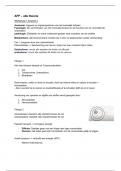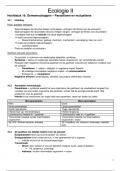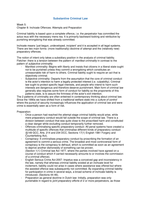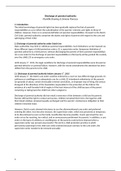NOTES
KEYWORDS:
❖ Indigenous- naturally found in an area
❖ Nomadic- describing people who move around from place to place to
find food for themselves and their livestock.
❖ Livestock- cattle, goats and sheep.
❖ Herders- people who keep herds of animals such as cattle and sheep and
rely on these animals to provide food and other goods such as clothing
❖ Demarcation- A border/boundary of a line on a map
❖ Colonize- To take over a territory (back then called a colony) and exploit
its natural resources; sends its own people to live in the colony.
❖ Barter- exchange of goods for other goods without using money.
❖ Stowaways- People who secretly hide in ships to escape from a country
or travel without paying.
❖ Settlements- Small communities (early ages)
❖ Wrenched- Taken away from a person or object willingly by force.
❖ Emancipation- To be set free.
❖ Cargo- Goods transported by ship or plane.
❖ Trek Boers- White farmers who moved away from the cape.
❖ Extinction- To completely die out.
,SAN HUNTER-GATHERERS
▪ First people to live at the Cape.
▪ Got their food by hunting and gathering plant foods like
fruits,nuts,berries and roots from the environment.
▪ Lived in small groups and were nomadic (to find different plant foods
at different times of the year)
▪ They lived all over Southern Africa. Their rock paintings and
engravings were found all over SA.
▪ When the Dutch colonized the Cape in the 17th Century there were
San living in the Cape.
KHOI-KHOI HERDERS
• Cattle were used for their meat and cows were used for their milk.
• 2000 years ago, the Khoikhoi moved into the Southern western parts of
southern Africa.
• Had herds of hairy fat-tailed sheep.
• Settled in the winter rainfall areas in the Cape where there was good
grazing for their sheep.
• Were larger than the San groups.
• Moved around to find better grazing for their livestock.
• Lived in reed houses so that they could take it with them when they
moved around (Were nomadic)
, WHERE AFRICAN FARMERS WERE SETTLED
♦ About 2000 years ago they started settling in the Eastern parts of southern
Africa.
♦ Grew crops such as sorghum and millet which needed summer rainfall.
♦ They settled to the east of the Cape in areas that received around 50mm
of rain over the summer growing seasons.
♦ Kept sheep, goats and cattle.
♦ By 400AD, they had spread through most of the eastern parts of southern
Africa and as far south as the Fish River.
♦ By the 17th century they were using grazing lands as far south as the
Sunday River.
♦ They stayed in the eastern parts of southern Africa for a few years. They
chose a place close to a river, they cleared the land where soil was good
and prepared the soil and planted crops.
Farmers did not settle:
On the highveld because it was too cold for their crops.
Too far west near the Kalahari Desert as it was too dry.
In Drakensberg because it was too cold and too hilly for growing crops.
♦ Farmers built more permanent houses than the hunter-gatherers and
herders.
♦ In the forest and savannah grassland areas east of Drakensberg they used
mainly wood, reeds and grass to make houses.










